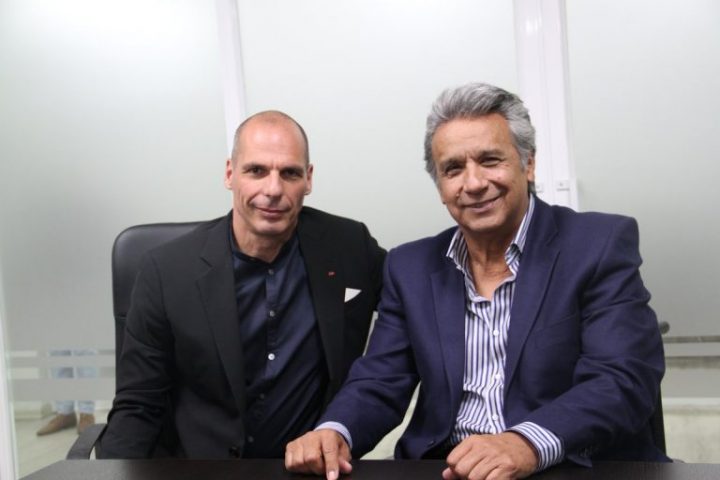PRESS RELEASE DiEM25
Sunday, April 23
On Sunday, April 23, DiEM25 co-founder, Yanis Varoufakis had a 2-hour meeting with top economic officials of the government (including the Minister of Economic Coordination Mr. Rodrigo Martinez, the Minister of the New Economy and Human Capital Mr. Andres Arauz, and secretaries-general of the various economic ministries).
The conversation focused on the question of how can a government that does not practice unilateral monetary policy (Ecuador because of being bound to the US dollar as its national currency, Greece as a member of the Eurozone) maintain a degree of sovereignty regarding the provision of liquidity (in the private, public, and banking sectors) and the management of the trade balance. Following the presentation of innovative solutions by the economic cabinet which have helped Ecuador absorb strong economic shocks (e.g. the financial crisis of 2008, the drop in oil prices of 2014, as well as a catastrophic earthquake last year), Mr. Varoufakis discussed the difference and similarities between the innovations of the Ecuadorian government, and those that he developed with the Greek economic cabinet in the period between January and June 2015. There was agreement on the importance and usefulness of digital systems for the preservation of economic stability of countries which do not have their own currency, as well as for their sustainability within the dollar (for Ecuador) or euro (Greece) zones.
Monday, April, 24
On the morning of Monday 25 April, Yanis Varoufakis gave a lecture to a large financial conference (with delegates primarily from the insurance and banking services) which took place at the Hilton Hotel of Quito, on the topic of international imbalances in capital flows, trade, and debt.
Afterwards, he appeared at the Ministry of Foreign Affairs where he had a 3-hour meeting with the Foreign Minister, Mr Guillaume Long. In their discussion, they covered the geopolitical implications of the international and European crisis, the pan-European activity of DiEM25, and the possibility of the Ecuadorian government spearheading an international movement aimed at promoting democracy in Latin America, based on the example of DiEM25. Finally, Mr. Long accepted Mr. Varoufakis’ invitation to DiEM25’s major event in Berlin on 25 May, with the theme: How will DiEM25 give electoral expression and political power to the European New Deal – the movement’s economic and social agenda, which was presented in Rome on 25 March.
The same night, at the Institute of High National Studies (IAEN), Mr Varoufakis, in the presence of ministers, the institute’s Chancellor, the Governor of the Central Bank, journalists, academics, and university students, gave a lecture on the topic of “Geopolitical and Monetary Flexibility: Central Banks, cutting-edge technology, and the global division of labour” (see here and here).
Tuesday, April 25
On Tuesday 25 April, Mr. Varoufakis was received by the President-elect of the Republic (the inauguration is scheduled for 24 May) Mr. Lenin Moreno, and Ms. Maria Fernanda Espinosa y Eduardo Mangas who will take over as Foreign Minister of the country – and with whom he had an hour-long meeting previously. The meeting began with the discussion of the European and Greek crises, followed by an in-depth conversation of the economic and trade challenges that Ecuador will face in the following years, and was concluded with an overview of DIEM25’s European actions and plans.
Following this, Mr. Varoufakis made an official visit to the Presidential Palace where he met with the outgoing President, Mr. Rafael Correa. After the end of the official part of the visit, Mr. Correa and Mr. Varoufakis, in the presence of the Foreign Minister Mr. Guillaume Long, the Minister of the New Economy Mr. Andres Arauz, and the Secretary-General of the ruling party, discussed the future partnership between Mr. Correa and his associates with DiEM25.
During his exit from the Presidential Palace, Mr. Varoufakis made statements to the media, and answered questions posed by journalists, stressing, among others, the importance of Ecuador’s experience in macroeconomic management for the countries of the Eurozone’s periphery.










